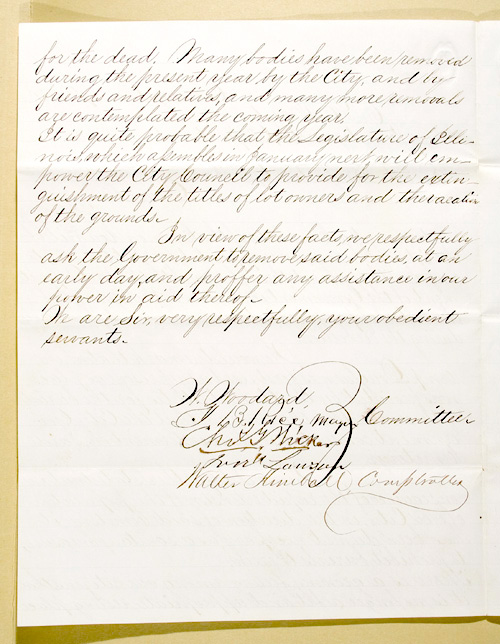This is the only record in the Common Council files relating to the Confederate prisoners buried in the City Cemetery's potter's field. There is no indication of either the response of the Chief Quartermaster, nor of how or when the rebel soldiers were exhumed and reinterred in Oakwoods Cemetery. George Levy, in his book, To Die In Chicago, details the disorganization that included missing bodies and the City Sexton's carelessness in recordkeeping. Levy believes many rebels were left behind and are still buried beneath what are now the baseball fields in Lincoln Park. |
Chicago, Dec 17th, 1866
C.H. Hoyt
Chief Quartermaster Department of the Lakes
Brevet Brigadier General,
Dear Sir:
The undersigned a Committee of the Common Council of the City of Chicago, were appointed, by said council, to confer with you, and through you, with the War department of the government, in relation to the removal of the bodies of prisoners interred in our City Cemetery, during the Rebellion.
We would remark that when Camp Douglas was first used as a prison, no place was provided by the United States for the burial of those who died therein, and that the City Government consented to their interment in said Cemetery.
We would further state, that in consequence of the rapid extension of the population of our City, in the direction of said Cemetery it has been deemed necessary as a sanitary measure, to prohibit burials therein.
There is a growing feeling among our citizens, that it is no longer a fit and appropriate resting place for the dead. Many bodies have been removed during the present year by the City, and by friends and relatives, and many more removals are contemplated the coming year.
It is quite probable that the Legislature of Illinois, which assembles in January next will empower the City Council to provide for the extinguishment of the titles of lot owners and the vacation of the grounds.
In view of these facts, we respectfully ask the Government to remove said bodies, at an early day, and proffer any assistance in our power in aid thereof.
We are Sir, very respectfully, your obedient servants.
W.Woodard
J.B. Rice, Mayors Committees
Chas G. Wicker
Iver Lawson
Walter Kimball, Comptroller |

|